The lives of musicians in the Philippines, amid a pandemic
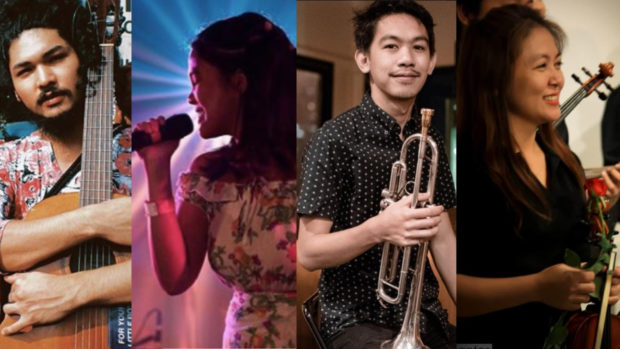
(From L) Giro Alva, Sofia Abrogar, Marc Nicolas and Fatima Aquias. Image: Instagram/@pinkmenmusicph, @sofiaien, Facebook/BrasPasPasPasPas, Fatima Aquias
Taking a look back at the heart of the Philippine music scene before the pandemic, one might remember the cramped bars, staying up until 2 a.m. just to catch your favorite band, or perhaps the sheer energy at the theater right before the orchestra leads listeners into the world of heavenly harmonies.
Fast forward to our reality now, almost six months into strict quarantine in the country — music lovers and audiences seem to have adjusted to the new normal by viewing their favorite artists within the confines of home, right in front of a screen.
But while music is unmistakably still alive during this difficult time, not the same could be said about the majority of these musicians’ careers, unfortunately, as they struggle to find new ways to earn a living.
Four urban musicians, the majority of which depend on their live performances and gig invites to get by every month, spoke with INQUIRER.net about how the pandemic has taken a toll on their livelihood and their way of living.
Giro Alva
Article continues after this advertisementAs a musician for almost 14 years now, 23-year-old Giro Alva does all around music-related work. He scores films, serves as session musician for bands doing their recordings, and performs in various bands.
Article continues after this advertisementFor a musician, his has been a productive career. He is a member of a lot of groups but the alternative folk-rock band Pinkmen where he is one of the lead vocalists and guitarist, and the rock band La Crema where he plays the bass, are some of his most active ones.
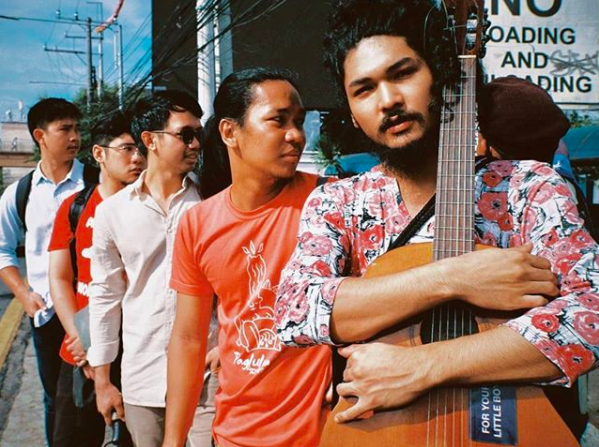
Pinkmen. Image: Instagram/@pinkmenmusicph/Nicky Aureo
Alva disclosed that before the pandemic, he earns around P3,000 on a “bad month” and around P20,000 on a “very good month.” Most of his income came from gigs, which are now still prohibited in the country while it is under quarantine, supposedly to prevent the spread of the novel coronavirus.
To adjust to the new normal while still making a living, Alva has been selling musical instruments. He has started teaching music online as well, but what he earns from music lessons are still not enough.
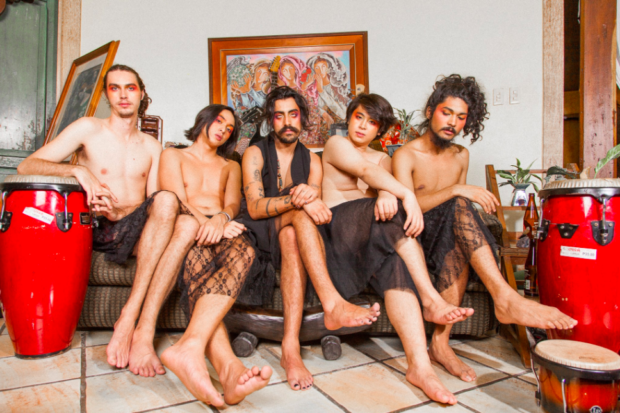
La Crema. Image: Facebook/@lacremamnl
Being a resident of San Mateo, Rizal, the lockdowns’s restrictions on public transportation prevent him from traveling to places where he might get more work, such as Makati and Quezon City. He said the travel restrictions are probably one of the “hard parts” about the new normal. Also, despite the availability of a few modes of mass transportation, Alva admitted he is still hesitant to commute due to the threat of the virus.
As to online performances that do not require commuting, Alva said his bands do get invited to play at online gigs, but they are more often than not unpaid.
To keep his skills sharp, he still composes at home. His bands have also been busy writing and recording new material.
“So me, I’m just honing my skills and trying new music. I’m still making music…,” Alva confirmed. “I just keep writing lately and just playing around.”
When asked if he thinks there is a lack of support from the government for musicians like him, Alva had to speak a brutal truth: “Yung mga health workers nga natin walang assistance, music pa kaya? Tang *na.”
(Our health workers themselves are not receiving assistance from the government, so what more [in the case of those] in music? Bullsh*t.)
Sofia Abrogar
The 19-year-old singer and college student Sofia Abrogar considers herself lucky to still be under her parents’ wings during the COVID-19 crisis.
Abrogar has been creating music all her life and is now mostly sharing her talent as one of the vocalists of the alternative pop band Any Name’s Okay, which has been active in the scene for about three years.
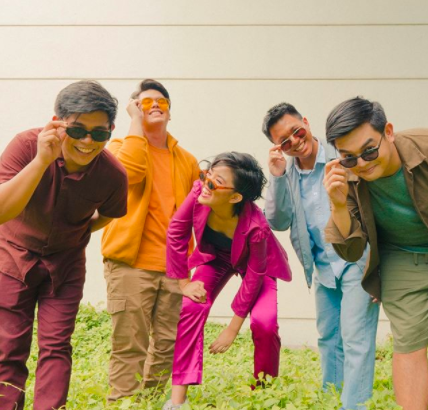
Any Name’s Okay. Image: Facebook/@AnyNamesOkay/Andrea Genota
Since the pandemic began, her band has been invited in several online gigs, which also serve as fundraisers for those who are more severely affected by the pandemic.
Abrogar noted that the budget for online gigs is “definitely smaller” than the usual music events. When it comes to performance invites, considering that she still receives support from her family, Abrogar opts to charge “little or none at all,” particularly because the majority of these invites are for charity.
“There aren’t really a lot of online gigs I’ve seen that are doing it simply for fun, or simply for music’s sake…,” she noted. “It is a lot of effort to put up an online gig and I think right now we really need to be helping the people out [there] who are suffering more in this pandemic.”
Abrogar cited the case of medical frontliners, the urban poor and the youth as some of the more vulnerable sectors.
The singer believes that the music scene has been resilient during the crisis and a lot of artists can now share their music through social media and other online platforms. But despite the scene’s seeming durability, Abrogar acknowledged the lack of government support for cultural workers who are unemployed and might not be getting proper compensation during these trying times.

Image: Instagram/@anynamesokay
On a personal level, Abrogar professes that music has been therapeutic for her, especially in keeping her mental health in check. But knowing that the health crisis is a sensitive time, Abrogar stressed she does not want to put music on a pedestal; industries should be given more focus, she said, along with the health sector and its workers. And without “stealing the urgency away” from frontliners, the singer explained why cultural workers are also in need of support during this pandemic.
“In the world of capitalism, cultural work is not considered the most lucrative,” she said. Abrogar acknowledged that there needs to be more support from the government to make sure musicians are economically and financially stable. This is important, she explained, so that musicians “could continue to create and nourish their passion and their careers.”
Marc Nicolas
Online selling is 26-year-old trumpet player Marc Nicolas’ solution to the lack of income due to the pandemic.
Coming from a family of musicians, Nicolas has been exposed to music since he was 10. He even finished a bachelor’s degree in music performance, major in trumpet, at the University of Santo Tomas (UST).
Being a musician for 16 years now, Nicolas has played for every kind of event that needs him — from funerals to musicals. He also plays for the funk-jazz band Brass Pas Pas Pas Pas. He likewise used to be a casual trumpet player for ABS-CBN’s Philharmonic Orchestra and was a principal trumpet player for the UST Symphony Orchestra.
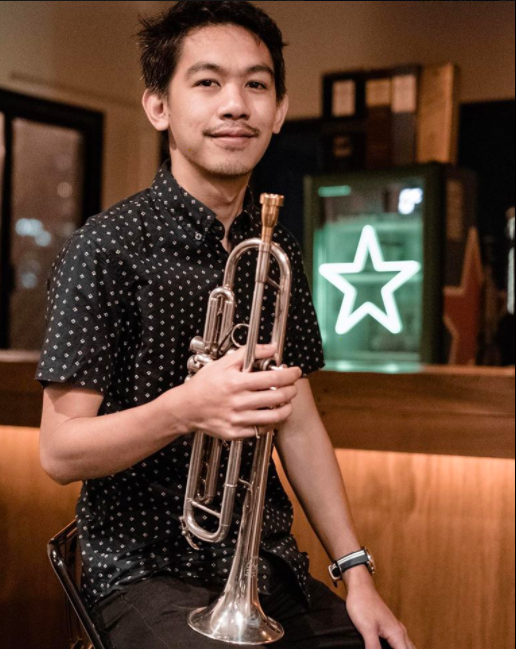
Marc Nicolas, trumpet player of Brass Pas Pas Pas Pas. Image: Facebook/BrassPasPasPasPas
Nicolas revealed that before the pandemic, he earns around P20,000 on a slow month, while during the “peak seasons” such as “ber months,” he could earn roughly between P30,000 to P40,0000. Like in the case of other musicians, the majority of his earnings come from events, concerts and gigs.
During the quarantine, Nicolas has been staying with his fiance in Bulacan and is trying to contribute to their monthly income by selling chicharon, brownies and other sweet treats. He echoed his fellow musicians in stating that what he gets from the online business is nowhere near his former income, but he is grateful to at least have some extra cash.
To support his fellow artists, Nicolas played for a benefit gig for other struggling musicians. The majority of his gig invites have also been for free.
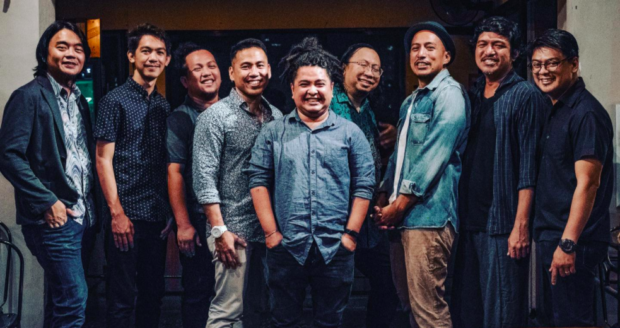
Brass Pas Pas Pas Pas. Image: Facebook/BrassPasPasPasPas/Yna Patriarca
Viewing some of the positive impacts of the quarantine, Nicolas noted how his fellow musicians are adjusting to the new normal. Some, he said, began getting into studying sound mixing and video editing. He is delighted to see people finding ways to share and make music together, but at the same time, he acknowledged the great deal of adjustment that the music scene had to undergo.
“Sobrang laking adjustment kasi tinag na yung entertainment as least essential,” he said. “Kami yung huling makakabangon sa crisis na ‘to.”
(The adjustment was so big because we have been tagged as the least essential [workers]. We will be the last ones to bounce back from this crisis.)
“Sobrang mahirap kase ito lang yung alam kong gawin, kaya [nag-aadjust] ako para matuto ng ibang trabaho para kumita.”
(It is very difficult because this is the only work I have known, and that is why I adjusted, so I could learn other types of work, to earn.)
Fatima Aquias
Seeing music as the “bread and butter” of her entire family, 49-year-old Fatima Aquias of the string ensemble Aquias Strings really depends on freelance work to get by every month.
Aquias is a Manila resident and a proud mom of two more musicians: a 24-year-old daughter who plays the violin and a 23-year-old son who plays the cello.
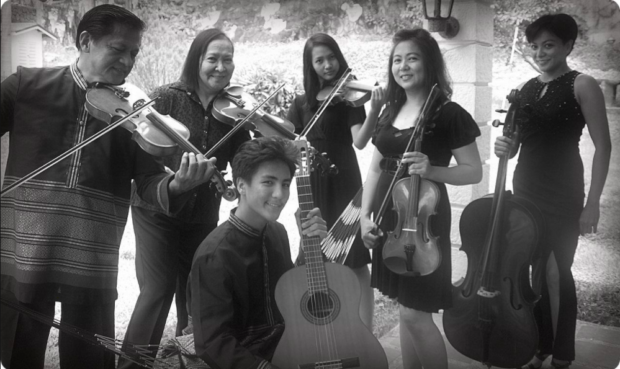
Aquias Strings. Image: Facebook/@AquiasandVirtuosiStringEnsemble
After the country was placed under the enhanced community quarantine last March, Aquias and her family have been relying on their savings, the help of friends, the local government’s relief packs, and the National Commission for Culture and the Arts’s (NCCA) P5,000 subsidy, to get by during this pandemic.
When the lockdown in Manila was downgraded to a less strict general community quarantine, she was able to accept students for online music lessons. Like some of her fellow musicians, Aquias also resolved to selling products online such as gourmet tuyo and peanut butter to earn cash.
Her family also got performance invites at a wedding, but only one of them was able to perform; they are after all a company of numerous members. The Aquias Strings are composed of Fatima, her eldest brother, her mother, Fatima’s two children and other members who are almost like family to them because of how long they have been with the ensemble.
“[Papa] ko pala [yung] lead violinist namin before kaya may AQUIAS STRINGS kaso namatay na [siya six years ago],” Aquias said. (My father used to be our lead violinist, that is why we have Aquias Strings, but he died six years ago.) “His name is Cayetano Edward B. Aquias but fondly [called] TANNY AQUIAS.”
Her father marked his death anniversary on July 25, six years ago, and perhaps more luckily for the man, he left while the world was still free of COVID-19.
NCCA’s cash subsidy
The National Commission for Culture and the Arts offered a one-time P5,000 assistance to artists and cultural workers who lost their jobs or cannot practice their profession due to the quarantine measures enforced by the government.
A P3 million budget was allotted to NCCA’s National Committee on Music. It proposed to give assistance to 88 beneficiaries inside Metro Manila and 32 more for each of the 16 regions outside the national capital region. The committee targeted to reach 600 freelance musicians or professionals in particular types of music disciplines (music educator, instrument maker, musical director, composer and arranger.).
Other qualifications stated in NCCA’s proposal indicated that an applicant must have no other source of income due to the quarantine. They should also be freelancers and preferably breadwinners of the family, or with a senior citizen dependent. The applicant must not have received any other cash subsidy from other government agencies as well.
Aquias was one of the recipients of the cash subsidy in Metro Manila. She said she saw about the application online and was able to receive the money through a money remittance center. It somehow helped her family, she said, but she does not think it was enough to sustain other musicians during the pandemic.
After seeing NCCA’s project online, Aquias admitted she initially did not apply because she thought she would not get it.
“Kala ko di kami mabibigyan dahil isa sa mga kakilala ko na-turn down kasi mali [yung] naemailan [niya],” she recalled. (I thought we would not be given [any subsidy] because one of the people I know [who applied] got turned down, because she emailed the wrong email address.)
“Then si Ma’am Gina Medina Perez (my violin [professor]) and ma’am Nenen Espina helped me in applying for the [NCCA grant].”
Nicolas and Alva also tried applying for the same grant but unfortunately did not get it. Speaking about his experience, Alva said that NCCA’s project was “kind of slim.”
“[Kokonti] lang ‘yung mga offer nila (Their offer was so little) and it was only one P5,000 check for f*cking whole three months,” Alva lamented.
Alva, who is even a former winner of the government-sponsored National Music Competitions for Young Artists (NAMCYA), added that not anyone he knows personally who applied also received the subsidy.
In an interview with INQUIRER.net, NCCA’s head of the national commission on music, Felipe de Leon Jr., admitted that the cash assistance project was “very limited.”
“Ang nabigyan lang namin ay konting-konti lang (We managed to give the [subsidy] to very few people), we were able to give [to] 794 musicians,” de Leon said. “‘Yun lang ang kaya namin (That’s all we could give) 794 for P5,000 each. One time cash assistance… I doubt that there will be a second batch.”
Discussing how the commission plans to continue helping and promoting these musicians during the health crisis, de Leon spoke about NCCA’s current and upcoming projects for the rest of 2020.
NCCA recently launched the first episode of its online cultural digital program “Padayon: The NCCA Hour” (a Visaya word meaning “to move on or to continue doing something”) via its Facebook page on July 28. According to de Leon, the show will interview different artists and will be featuring a lot of musicians.
The show also aims to use this quarantine period to “to ignite and instil in all Filipinos the appreciation for and love of arts and culture and inculcate a sense of understanding and pride in our heritage and what makes us distinctly Filipino,” as per NCCA.
In terms of how it could help musicians, one of its segments “Sining Saya” features different personalities from various fields, cultural presentations and recorded dance performances.
Other proposed projects that musicians can still try applying for this year are:
- Making instructional materials for online classes
- 10 slots with P100,000 budget (P10,000 each)
- Making instructional materials for online classes
- 10 slots with P100,000 budget (P10,000 each)
- Online performances for musicians
- 20 slots with a P100,000 budget (P5,000 talent fee per performer)
- Online performance of new works
- Musicians can apply works that have “relevant and timely themes,” such as music related to the COVID-19 pandemic
They could also avail for NCCA’s other projects such as:
- Music education training for music educators
- Music seminar workshops (10 slots)
- Recording and publication of existing non-traditional music (concert music, overtures and symphonies)
- Publications in print and audio of “any kind of music” that is not covered by the academe (folk, kundiman, etc.)
Why music is important
Describing the arts as the “best way to expand consciousness,” de Leon described in detail a bland and colorless world that will ultimately lead to the “death of the soul” without music and the arts. And amid this period of isolation for most everyone, he asked, “How else can we travel, [even] through the imagination without the arts?”
“The best substitute — best alternative — is through the arts,” he said in relation to feeling human connections during the crisis. “You can be in contact with other people through theater, through music, through dance.”
De Leon noted how people will be bored without movies, television, dance and music. He said expression is a “basic need” for human beings. This could take many forms, including dance, song or a theater performance. He then highlighted the power of seeing others perform and becoming one with what they are watching.
“You experience life vicariously through the actors and actresses, through the protagonist, through the villains…,” he said. “Living life through art, that’s very, very important otherwise patay tayong lahat (we are all dead).”
Nicolas echoed how music could be a “big source of relief,” whether you are a musician or not, during the pandemic. Aquias also believes that “we give inspiration, hope [and] healing through our music.”
Beyond its feel-good functions, Alva and Abrogar emphasized how music could also be used as a means of expressing one’s dissatisfaction and dissent about political matters affecting the public.
Considering the COVID-19 pandemic as a “socio-political issue,” Abrogar said that she values music as a “powerful tool” in expressing one’s opinions. The two also acknowledged how their fellow musicians have been “stepping up” with the music they produce, using it to speak up about current events.
“Especially yung ngayon na parang dangerous na mag-direct output as a journalist,” Alva stressed. “Musicans [are kind of more immune] sa ganon na pagbatikos. When you write a perfect song, na naka-keep doon yung message and hindi mo kailangan na super obvious na mag-criticize ng government, it’s just creative.”
(Especially now, it is dangerous to put out work as a journalist, musicians are kind of more immune to that type of criticism. When you write a perfect song, wherein you can keep the message without being super obvious about criticizing the government, [then] it’s just creative.) JB
RELATED STORIES:
UP cum laude graduate refuses glorification of poverty, explains why it’s a hindrance to success
Uncertainties grip new normal in learning
Love, queer and constant: 3 LGBTQ+ couples triumph over lockdown
For more news about the novel coronavirus click here.
What you need to know about Coronavirus.
For more information on COVID-19, call the DOH Hotline: (02) 86517800 local 1149/1150.
The Inquirer Foundation supports our healthcare frontliners and is still accepting cash donations to be deposited at Banco de Oro (BDO) current account #007960018860 or donate through PayMaya using this link.